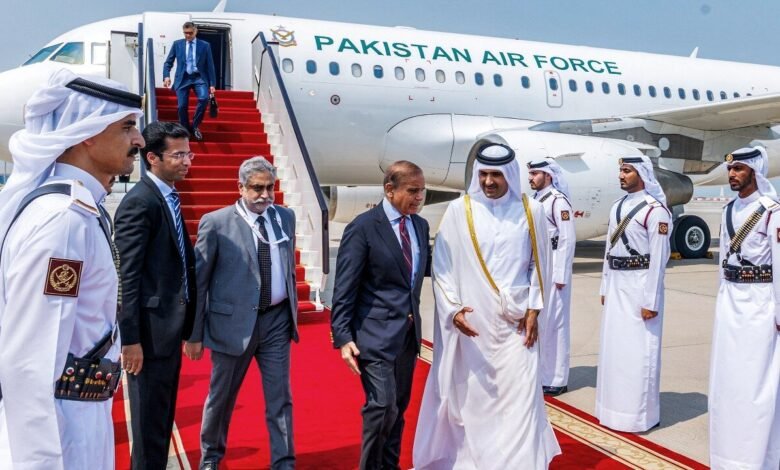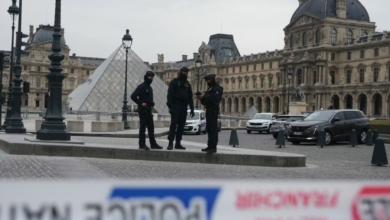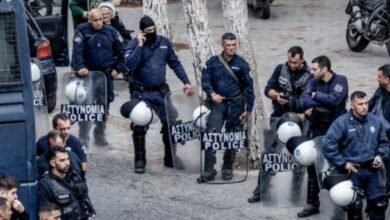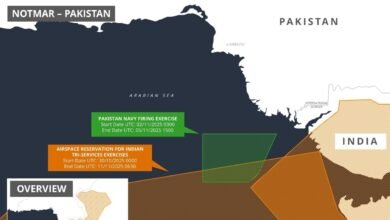Qatar summit: Push for Arab Nato in meeting attended by Pak, Turkey

Qatar summit: Push for Arab Nato in meeting attended by Pak, Turkey
On Monday, scores of leaders from Arab and Islamic nations rushed to Doha, for an emergency meeting to present a united response to Israel’s strike on Hamas leaders in Qatar there last week. Although the leaders differed on the way forward and settled on only minimal action against Israel, a more concrete outcome may be that they have set in motion the emergence of an Arab military alliance.
The proposed alliance, dubbed “Arab Nato” by Egypt, which has the Arab world’s largest army, came in the meeting in Qatar attended by Pakistan and Turkey. Given that Turkey backed Pakistan with men and machine during Operation Sindoor in May, should such a military alliance be of concern to India?
Pakistan, the only nuclear-armed Muslim state, not only attended the emergency summit but also called for a joint task force to “monitor Israeli designs in the region”. Turkish President Recep Tayyip Erdogan, who was also present at the Summit, called for an “economic squeezing of Israel”.
Iraqi Prime Minister Mohammed al-Sudani also batted for a Nato-style collective security framework, stressing that “the security and stability of any Arab or Islamic country is an integral part of our collective security”.
The decade-old initiative, launched by Saudi Arabia after the Arab Spring, announced the formation of a 34-nation Islamic alliance against terrorism. That plan is now being fast-tracked following Israel’s airstrike on Doha, as Donald Trump’s US is busy revisiting its security engagement terms with allies worldwide.
ARAB-ISLAMIC NATIONS REVIVING NATO-LIKE DEFENCE SHIELD
The emergency Arab-Islamic summit in Doha, convened by Qatar on Monday, also marks a big moment in Middle Eastern geopolitics and security, with Egypt’s renewed push for a NATO-like collective defence mechanism.
First proposed by Cairo at the 2015 Arab League Summit in Sharm El Sheikh amid the Yemen conflict and the rise of ISIS, the idea of a joint Arab force has long languished due to sovereignty concerns, regional rivalries, and logistical hurdles.
However, Israel’s unprecedented airstrike on Doha, which killed five low-ranking Hamas members and a Qatari security officer, has breathed new life into the concept.
Egyptian President Abdel Fattah al-Sisi, leveraging his country’s status as home to the Arab world’s largest military (over 4.5 lakh active personnel), has positioned Cairo as the alliance’s nerve centre.
HOW EGYPT IS PROPOSING THE ARAB NATO
Reports indicate Egypt is offering to contribute up to 20,000 troops initially, with the headquarters of the “Arab Nato” in Cairo and an Egyptian four-star general as the inaugural commander. The force would rotate leadership among the 22 Arab League members, incorporating land, air, naval, and commando units, alongside integrated training and logistics.
Saudi Arabia is eyed as a principal partner for the deputy command role, potentially drawing in Gulf states like the UAE and Bahrain for funding and advanced capabilities.
The proposal frames itself as a “defensive umbrella” rather than an offensive pact against Israel. It aims to deter security threats and terrorism or anyone who poses a threat to the Arab world’s safety and stability.
At the summit on Monday, Qatari Emir Sheikh Tamim bin Hamad Al Thani lambasted the Israeli attack as “blatant, treacherous, and cowardly,” accusing it of sabotaging US-backed Gaza ceasefire talks. While the joint statement urged reviewing diplomatic ties with Israel and pursuing legal action, the real momentum lies in military integration.
ARAB NATO IS MORE TALK THAN ACTION: EXPERTS
Analysts note that the Gulf Cooperation Council’s (GCC) pledge to activate its joint defence pact could serve as a foundational layer, with broader Arab participation expanding its scope.
However, the case for an “Arab Nato” did not see a concrete outcome as member states produced only condemnations and vague pledges instead of binding commitments. It basically lacked teeth. While Egypt is backing an “Arab Nato”, Shia Iran is looking to give it a broader Islamic look.
Egyptian-American author Hussein Aboubakr Mansour said the Doha summit exposed deep divisions, and yielded symbolism, not substance.
“The fact that the Arab Nato is Egypt’s idea and the Muslim Nato is Iran’s, tells you everything about the delusional, thinly veiled pyramid scheme and what other countries think about. The Saudis would rather fund the Iron Dome before giving protection money to either Egypt or Iran,” Aboubakr Mansour said on X.
Steve Hanke, a Johns Hopkins economist, dismissed the summit as “all bark, no bite”.
The current proposal of the “Arab Nato”, however, shifts focus from counter-terrorism to collective security. If realised, this could reshape regional power dynamics, reducing reliance on faltering US guarantees, as evidenced by Washington’s apparent inaction during the Doha strike.
WILL PAKISTAN IN ARAB NATO MEAN ANYTHING FOR INDIA?
Pakistan’s active role at the Doha summit, along with that of the US-led Nato-member Turkey, underscores the potential ripple effects on South Asia, particularly for India, its perennial rival.
Represented by Prime Minister Shehbaz Sharif and Deputy Prime Minister/Foreign Minister Ishaq Dar, Islamabad not only co-sponsored the gathering but aggressively advocated for an “Arab-Islamic task force”. He emphasised a “clear roadmap” for Muslim unity, warning that the world’s 1.8 billion Muslims were “eyeing this summit” for decisive action.
“It [Israel] should not be allowed to get away with attacking Islamic countries and killing people with impunity,” Dar said.
This isn’t mere rhetoric; Pakistan’s involvement ties directly to its strategic ambitions.
As the sole nuclear-armed Muslim nation (with an estimated 170 warheads), Islamabad views the alliance as a platform to amplify its influence in the ummah, potentially accessing Arab funding and military tech amid economic woes.
Pakistan’s Islamic Military Counter Terrorism Coalition (IMCTC) membership further positions it as a bridge between Arab and broader Islamic forces, with Sharif assuring Saudi Crown Prince Mohammed bin Salman of diplomatic backing at the UN Security Council, where Pakistan holds a non-permanent seat until 2026.
In the past too, Pakistan has repeatedly internationalised the Kashmir issue, which India maintains is strictly bilateral. For instance, it raised the matter at the Organisation of Islamic Cooperation (OIC) in 2019, prompting India to boycott the Abu Dhabi meet after Pakistan pushed for a resolution.
Thus, for India, the implications could be profound and multifaceted.
Turkey has already been amplifying Pakistan’s narrative on Kashmir. Even during the four-day mini-war in May, Ankara not only shared military hardware but also sent personnel and technicians to Pakistan against India. In a Nato-like security agreement, where an attack on one member is considered an attack on all, and military responses are coordinated, such an alliance could understandably make India uneasy, especially with both Pakistan and Turkey as part of it.
At the same time, the proposed “Arab NATO” raises pertinent questions about how other member states like Kuwait, Qatar, the UAE, Saudi Arabia, and Egypt, with whom India enjoys favourable partnerships, will align themselves. How these dynamics unfold will be crucial to watch.
Moreover, New Delhi’s ties with Israel, spanning defence (over $2 billion in annual arms imports) and energy, may place it at odds with the summit’s anti-Israel thrust.
More alarmingly, Pakistan’s integration into a nuclear-capable Islamic bloc could embolden its Kashmir revisionism, where Islamabad could seek multilateral legitimacy for its narrative and proxy activities.
However, as of now, the “Arab Nato” remains primarily directed against Israel, while potential members like Saudi Arabia, the UAE, and Egypt maintain friendly relations with India.
In sum, while the “Arab Nato” remains embryonic, the spectre of Pakistan’s involvement heightens India’s strategic anxieties, which demands vigilant diplomacy to safeguard its multifaceted interests. As the dust settles after the Doha summit, the real test lies in the cementing of the military alliance, something India will be watching with caution.
– Ends
Source link



